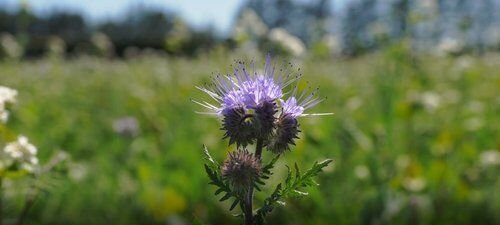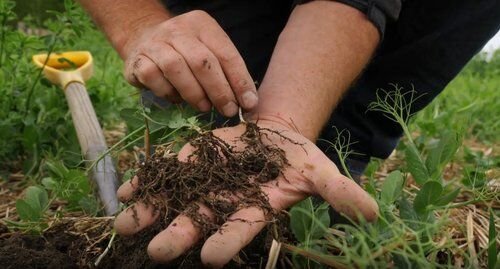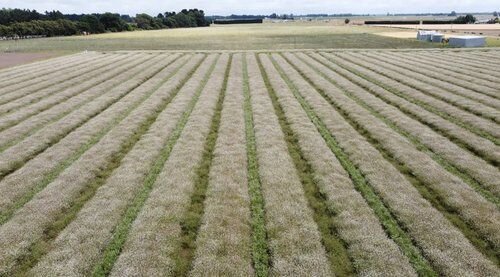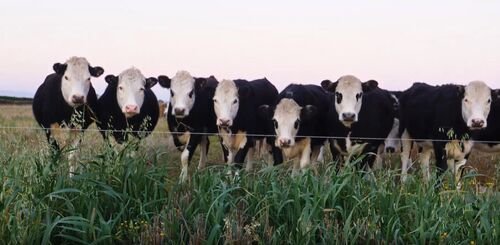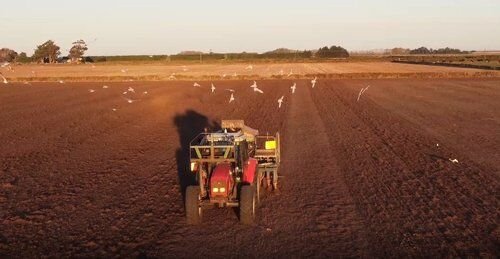Introducing David Birkett and Nigel Greenwood
Canterbury arable farmers David Birkett and Nigel Greenwood are increasing the health, resilience and profitability of their farm systems as a result of many years of building soil health, adapting farm machinery and growing their knowledge and experience of working with biological systems.
Video description: Nigel has transitioned to a no-till system, with significantly reduced chemical inputs thanks to improved soil and crop health.
Video description: David has developed a low input system that includes using living roots in the soil as much as possible to accelerate soil health gains.
More on the farmers featured in this case study
David and Nigel are examples of what is possible when farmers commit to long term systems change focused on building soil health, but the transition requires patience and commitment.
Nigel Greenwood
Nigel Greenwood farms near Southbridge, Canterbury on Templeton Silt Loam soils. He grows malting barley, milling wheat, ryegrass seed, clover seed, and peas. Cattle, ewes and lambs graze his cover crops and seed crops before and after harvest.
Over the past 8 seasons Nigel has been transitioning to a no-till system, with significantly reduced chemical inputs. Due to the condition of his soil when he took over the farm, he did not go ‘cold turkey’ on either tilling or pesticides but spent multiple seasons getting the soil and crops to a condition where they were no longer required.
David Birkett
David Birkett farms near Leeston, Canterbury on Temuka Silt Loam and Paparoa Sandy Loam soils. The whole farm is in crop over summer and livestock are integrated over the winter period. He grows cereals, ryegrass seed, legumes and vegetables, both for fresh harvest.
David has focused on developing a low input system and improving soil quality for 25 years. However in the last few years he has learnt how keeping living roots in the soil as much as possible can accelerate his soil health gains.

“Where we've probably changed that approach just in the last couple of years is using the biologicals as more of a preventative, and only using the chemicals if a problem does develop. In the last three years we've been able to cut between 25 and 30% out of our pesticide program costs.”
David Birkett, Canterbury arable farmer
Related content on: mindset, management
Educator and author John King believes in helping farmers help themselves, and that it's up to farmers to make the changes they want to see.
Otago farmer and mother Ruby Frew talks about juggling family and farming, her journey into farming and how becoming a mother has changed her life.
The podcast heads to the Underground Festival in North Canterbury to capture some of the conversations that took place during this wonderful celebration of soil.
In-the-tractor with Otago dairy farmer Otto Dogterom to unpack his approach to farming, and the value he places on looking after finances, people and environment.
Australian farmer and educator Darren Doherty discusses farm systems function, design and management, and the common hurdles in practice and mindset.
Kiwifruit orchard manager Levi Belcher shareds how he got started in the industry, and why he was attracted to soil health and regenerative practices.
.
An in-depth and personal conversation with third generation sheep and beef farmer Zeb Horrell, who openly discusses the challenges and opportunities facing our farming communities.
Manawatū dairy farmers Charlotte & Russell Heald talk about how their transition to farm ownership, to regenerative then to organic has them "living their dream life".
Kaukapakapa farmer Stephen Newman shares his journey in and out of dairy farming, discovering regenerative agriculture, growing kiwifruit and the power of farm discussion groups.
Sam Lang (Quorum Sense, Foothills Farming) and Jules Matthews (CREATE coach, Mangaroa Farms) share a simple process for identifying the limiting factors ‘putting a drag on your system’.
From his off-grid cabin, Northland-based beef farmer and Quorum Sense Team member Nick Tucker dives deep into the opportunities of having more, with less.
Coromandel drystock farmer Ewan Campbell’s unorthodox approach to farming has seen him battle the system, revitalise his soils and win national food awards.
Renowned eco-nutritionist Phyllis Tichinin speaks passionately about the links and parallels between human health and the health of our food systems.
Passionate about food, farming and people, Australia's Charlie Arnott shares insights from his regenerative journey to create a more diverse, resilient and authentic farming system.
Canterbury farmer and Quorum Sense team member Sam Lang talks about the relationship between science and farmer experience, risk, and the importance of support networks.
New farm, new home, new partner, new baby! A whole lot has transformed for Jake Herron in the last two years. A real and refreshing story.
Michael Reilly shares the ups and downs of his journey from Sydney suburbia to regenerative Hawkes Bay farmer, and what's changed along the way.
Two very different vineyards, one in Marlborough another in Canterbury’s Waipara hills, offer different perspectives on what it means to operate regeneratively.
Improving the relationship between soil and plant health is fundamental to helping cycle nutrients and increasing nutrient availability to the vines.
Introducing two Canterbury arable farmers who are increasing the health, resilience and profitability of their farm systems, with a focus on building soil health.
Farm data comparison of the crop management inputs and associated gross margins of biological or regenerative farming systems for three common arable crops.
Retaining crop residues and integrating cover crops are key practices that both protect the soil surface and keep living roots in the ground year-round.
Exploring different practices for building soil health and broader ecosystem health, which underpin the success of biological and regenerative arable systems.
In this fourth session of the 2020 Post-Harvest Debrief, we are joined by mixed arable farmers Mike Porter and Roger Small to discuss successes and learnings from this season.
Disclaimer: The information, opinions and ideas presented in this content is for information purposes only and does not constitute professional advice. Any reliance on the content provided is done at your own risk. (click here to view full disclaimer).

